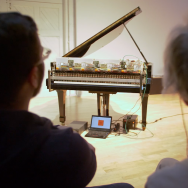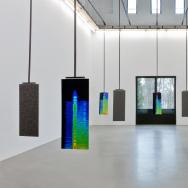Early last year, Assoc. Prof. Ghenwa Hayek signed on to become the interim director of the University of Chicago’s Gray Center. A month after she accepted the interim directorship, the COVID-19 crisis was officially declared a pandemic.
Uncertain times call for certain decision-making, and Hayek quickly embraced the challenge. The Richard and Mary L. Gray Center for Arts and Inquiry has long convened scholars and artists in the spirit of interdisciplinary collaboration—but without in-person events, it would have rethink the nature of its mission.
As the world locked down, Hayek decided to look out. Over the summer, she devised an online program to support artists from across the globe. She named it FarBar, a nod to the Gray Center’s monthly in-person conversation series Sidebar.
“With FarBar, we hoped to maintain a Gray Center tradition of experimentation and collaboration while broadening the reach of the Gray,” said Hayek, a faculty member in the Department of Near Eastern Languages and Civilizations. “We wanted to introduce ourselves and our audience to a global cohort of experimental artists who share our vision, and whose practices had been adversely affected by the pandemic—as all of our lives have.”
In launching FarBar, the Gray Center reached out to artists and cultural producers whose work has been deeply compromised by the pandemic. The invitation was unconventional: It asked artists and cultural producers to think about what they needed most, and came with no strings attached.
Many grants in the art world and academia are contingent on the delivery of an end product. To create emergency grants, FarBar repurposed funding that would otherwise have gone to travel and lodging for international guests. The Gray Center extended these grants with an invitation—not a requirement—to stage virtual performances for the public.
With FarBar’s support, Egyptian artist Amira Hanafi launched a new project to examine the implications of the English Language Unity Act—a far-right legislative proposal, drawing opposition from numerous civil rights groups, to make English the official language of the U.S. In an online event hosted by the Gray Center, Hanafi invited participants to translate the resolution into various languages in real-time. They then read the translations aloud, a playful rebuke of the nativist ideology driving the failed resolution.
“Ghenwa’s invitation gave me a lot of space to think about what a public event could look like in the conditions we live in now,” said Hanafi, whose project is still available online. “We had good conversation around timing and duration of an internet event. That helped me make the decision to keep the invitation to edit the document open indefinitely.”
Another recent FarBar event brought in Grammy nominee Nathalie Joachim, a Brooklyn-born, Haitian American musician whom critics have hailed as “a fresh and invigorating cross-cultural voice.” A flutist, composer and vocalist, Joachim discussed the importance of oral history and storytelling with Prof. Jacqueline Stewart, a leading film scholar, and Emily Lansana, the Logan Center’s director of community arts. Upcoming FarBars will include artists from Puerto Rico, the Philippines, South Africa and Lebanon.
“Ghenwa stepped into a difficult—really, an absurd situation,” Gray Center director Seth Brodsky said of Hayek, who took the interim position when he began an academic sabbatical. “But she did far more than greet it with aplomb and inspiration. She took it as an extension of how we already try to think and work at the Gray. She refused the category of “normal” and instead asked: what’s suddenly now possible? What, now, in a crisis, could suddenly be ideal? The FarBar really is an ideal example of form-making, forging, in a critical moment.”
The work is a credit to Hayek’s international vision. An accomplished translator, Hayek has also guided the Gray Center’s partnership with the 2020 Busan Biennale—bringing the international art exhibition to the University and to the greater Chicago area. These efforts will help support local venues, such as The Empty Bottle, whose shows have been drastically upended by COVID-19.
A yearlong series of projects, the “Chicago Chapter” of the Busan Biennale will begin March 5 with a public talk between South Korean artist Kim Heecheon and Kim Gordon, a founding member of the alternative rock band Sonic Youth. Gordon is also one of 11 artists from the Biennale scheduled to take part in a spring sound installation on the UChicago campus.
A sister city of Chicago located on the southern coast of the Korean peninsula, Busan opened its biennale during the early months of the pandemic.
“Despite our success, COVID-19 meant many were unable to experience the Biennale in person,” said Seolhui Lee, the exhibition team leader for the 2020 Busan Biennale. “I’m honored that the Chicago Chapter will cultivate a wider audience for the work that was done here in Busan.”
Other recent and upcoming FarBars include:
Jan 27: Beatriz Santiago Muñoz, artist and filmmaker
Feb 24: Patrick Flores, Manila-based curator
Mar 24: Omar Kholeif, curator and writer (rsvp-only)
Apr 28: Zoe Butt, Ho Chi Minh City-based curator
May 26: Mpho Matsipa, Johannesburg-based curator

